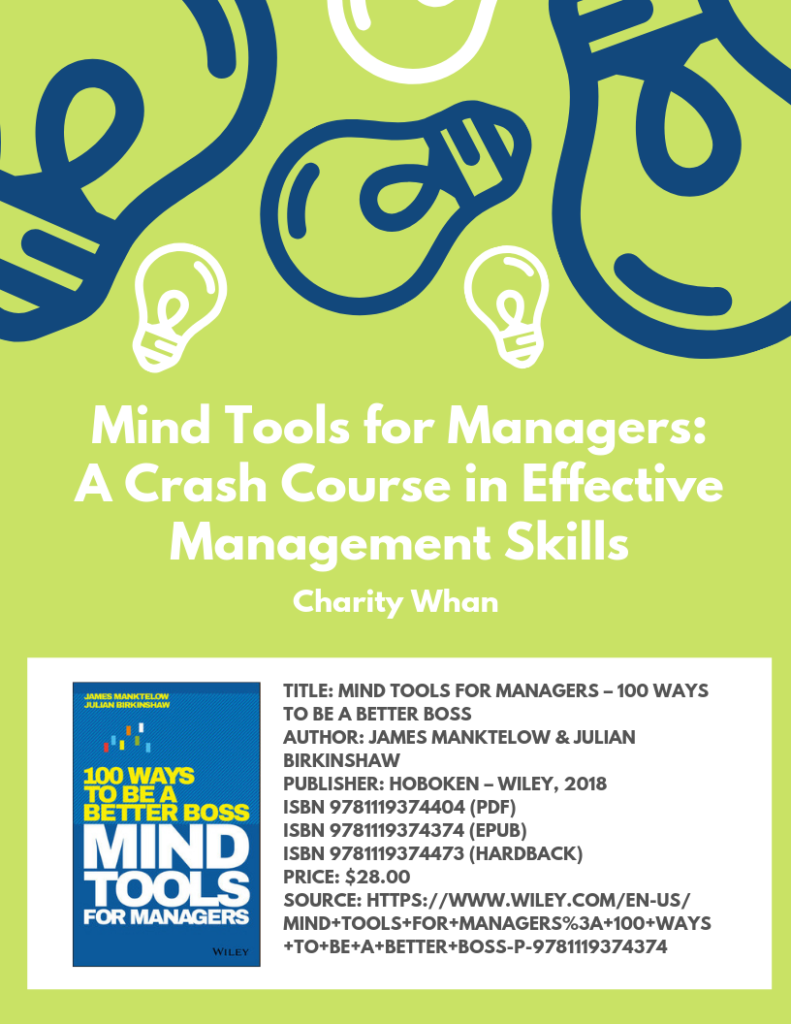Mind Tools for Managers: A Crash Course in Effective Management Skills

Mind Tools for Managers: 100 Ways to Be a Better Boss focuses on identifying the complete list of skills that managers can master to be better leaders in their organizations. The authors provide working professionals with practical advice for these competencies – such as the ability to adequately cope with change and stress – and they direct their readers to an accompanying website where they can access such external resources as videos, skill-building articles, and worksheets.
Key topics from this skill overview include:
- Understanding personalities and managing them accordingly
- Prioritizing tasks and finding more time in the day by eliminating low-yield activities
- Finding a work-life balance that works best for both the manager and employees
- Translating the organization’s mission into goals that people will easily understand
- Systematically getting to the root of a problem through Root Cause Analysis
- Understanding how to motivate people, including motivating those from different generations
- Resolving conflict, as well as dealing with office politics and protecting teams from it
- Working effectively with customers and external stakeholders
Title: Mind Tools for Managers – 100 Ways to Be a Better Boss
Author: James Manktelow & Julian Birkinshaw
Publisher: Hoboken – Wiley, 2018
ISBN 9781119374404 (pdf)
ISBN 9781119374374 (epub)
ISBN 9781119374473 (hardback)
Price: $28.00
Source:
https://www.wiley.com/en-us/Mind+Tools+for+Managers%3A+100+Ways+to+be+a+Better+Boss-p-9781119374374
The authors of Mind Tools for Managers bring together a lengthy background in career research and development, with a sustained history of solid research methodology. Utilizing a survey of more than 15,000 managers and professionals worldwide, the authors actually identify a grand total of 100 skills they deem necessary to be successful in today’s average organization.
Crash Course in Management Skills
Mind Tools for Managers can certainly be a resource to leaders as they work on developing the kinds of abilities they may need to be a better boss on the job. As a single volume resource, it is an easy-to-use toolkit for managers looking to improve their skill set. Each chapter contains a similar grouping of skills, such as those related to fostering creativity and innovation, and the external references as mentioned above are listed throughout the chapters where appropriate.
However, it’s probably telling of our current work culture that it’s even necessary to suggest that it requires 100 different skills for any manager to be successful. Obviously, it’s likely not possible that any one manager could ever use all 100 skills at the same time. It would take years for one person to even encounter all the various scenarios listed in this book. Considering this, readers can look at Mind Tools as a sort of crash course – a range of thoughts, ideas, and inspirations – that would be helpful at various points in a career.
The Challenge of Mind Tools
Group President Mads Nipper of Grundfos A/S provides praise on the book’s cover, stating that “many books on management suffer from the ‘Silver bullet’ syndrome, focusing on one important technique as the solution to all our management problems.” She says that Mind Tools stands in stark contrast as a book that dares to approach mastering the “many, many disciplines” it takes to be a good boss. While I do not technically disagree with that statement, I do believe authors can go too far in their attempts at comprehensiveness.
At several times, the reader is left wanting a little more detail and specific examples about how these skills might be applied. But it’s really no wonder, what with 100 individual ideas to cover, that the authors may have felt the need to keep their overview as brief as possible. This book has just over 240 pages, so it could be argued that a second volume might have been prudent, allowing the authors to flesh out the more important topics.
Further, it would have been particularly helpful if the authors had provided actual case studies or examples of how these skills were successfully implemented in real-life scenarios. Overall, however, Mind Tools for Managers is a useful book with its multitude of tips, best practices, and links to practical resources. It would certainly be considered a worthwhile read for all managers across a variety of industries, new and experienced alike.
Photo by rawpixel.com from Pexels

Download the PDF version of this article.
[ls_content_block id=”957″]
[ls_content_block id=”629″]
About the Author


